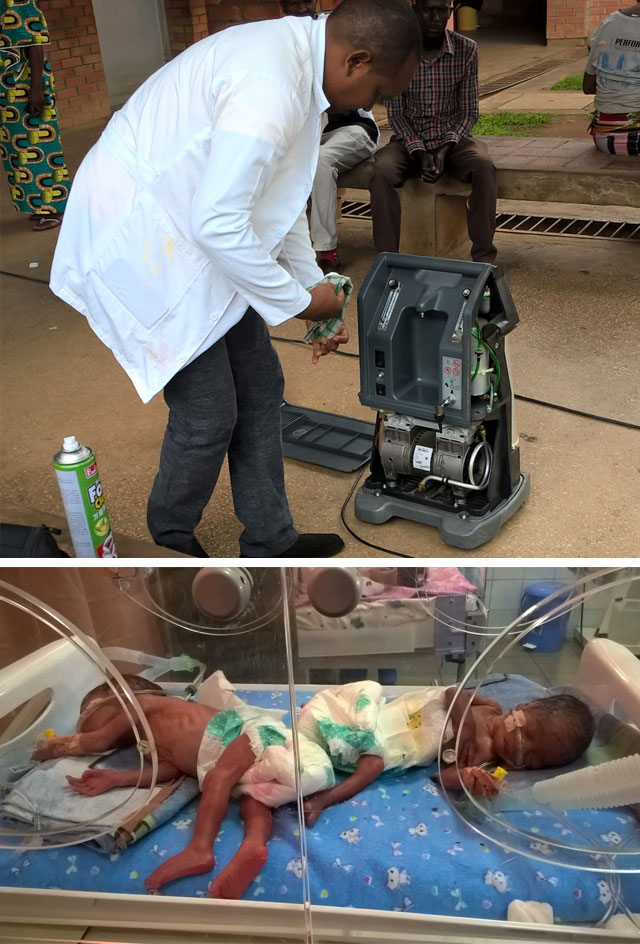News
February 13th, 2018
Over the years some parts of Africa have come to feel like a home away from home for Diamedica’s director, Robert Neighbour.
Rwanda is one such place, where Robert has been visiting Kabgayi hospital, Gitarama, for the last ten years and Kibagabaga hospital, Kigali, for the last three.
| Robert said he was highly impressed by the skill of the surgeons and anaesthetists
This has been to make numerous installations of equipment, and subsequent maintenance visits, which have led to building close relationships with key members of staff, volunteer surgical teams and a well established charity, the IOWD (The International Organization for Women and Development).
The work of IOWD is always of particular interest to Robert. It’s a charity that has purchased several of Diamedica’s Glosavent® anaesthesia machines, plus a couple of Diamedica’s Baby CPAP machines.
On this trip to Kibagabaga Robert said the Glostavent® standard did one operation lasting eight hours, ventilated. This was a fistula operation done by the IOWD, and Robert said he was highly impressed by the skill of the surgeons and anaesthetists who attended the patient in what was undoubtedly a long procedure.
Background to IOWD and Fistula
The IOWD has so far helped more than 800 women in Rwanda, where the Glostavent® has played an integral role in the procedures.
Obstetric fistula is a crippling condition caused by prolonged, obstructed labour during childbirth and more than 75% of women with it have endured a labour that lasted a staggering three days or more. According to the WHO, between 50,000 to 100,000 women worldwide develop it each year.
| Fistula is an injury that can only be treated through surgery
Often in these remote areas of the world, with no medical assistance during the birthing process, newly born babies die, while their mothers are left with horrific injuries – the tearing and puncturing of the bladder, for example, or the tissue between the rectum and vagina, or both – that result in chronic incontinence.
Quite beyond the physical effects of the condition, fistula also has devastating and far-reaching socioeconomic and psychological consequences, with many women abandoned by their husbands and struggling to live with the shame associated with incontinence.
Fistula is an injury that can only be treated through surgery.
A short film shot on location at the Kibagabaga Hospital illustrates the extraordinary work the IOWD is doing to help fistula sufferers. It’s worth noting that in this film a Glostavent® anaesthesia machine is clearly visible being used in some of the shots, demonstrating the direct surgical successes Diamedica’s innovative medical equipment brings to the story.
From Mothers to Babies
Also at Kibagabaga was a pair of preterm, low birthweight twins on Diamedica’s Baby CPAP machine. These babies were just a few days old and Robert was delighted to witness the lifesaving capabilities of this machine in action.
| Without CPAP most babies would not survive
Worldwide, the three biggest killers of neonates are prematurity, birth asphyxia (not enough oxygen to the brain), and infection, and the Baby CPAP is in constant demand to save lives. Indeed, staff often have to make tough decisions when need for CPAP outstrips availability.
Preterms can weigh less than a bag of sugar – 800g. Their lungs are not yet mature, causing difficulty in breathing, which may cause even greater weight loss from the energy spent through the very effort of breathing.
THE CPAP machines deliver air and oxygen at an increased pressure that can be adjusted according to the needs of the baby. The extra pressure from the CPAP machine helps keep the airways open and stops the lungs from collapsing. Without CPAP most babies would not survive.
Simplicity in the Rationale
Given Robert spends a good six months of the year in Africa, it begs the question WHY?
| We give engineering support, which is an important thing Diamedica gives across Africa
Quite apart from seeing the lives of the twins rescued first-hand, and the young woman’s life transformed by her fistula operation, Robert said he gets satisfaction from turning up to do a maintenance service – and finding there is nothing to do because everything is functioning in perfect working order.
Indeed, Robert said with a smile that the only machine he had to fix on this particular visit was another manufacturer’s anaesthesia equipment.
He said: “We fix a few things and people quite enjoy that. We give engineering support, which is an important thing Diamedica gives across Africa, not just in Rwanda.
“The people work very hard to do the job and they need supporting.”
Ultimately this reinforces one of Diamedica’s central purposes – to fulfil urgent healthcare needs. This happens in the first instance when Diamedica installs a machine, and is backed up with follow-up maintenance inspections and practical, hands-on support.
You can see the film about the work of IOWD, narrated by its director, Barbara Margolies, HERE

Above: Servicing the oxygen concentrator. Below: Premature twins benefit from Diamedica's life saving CPAP machine.
